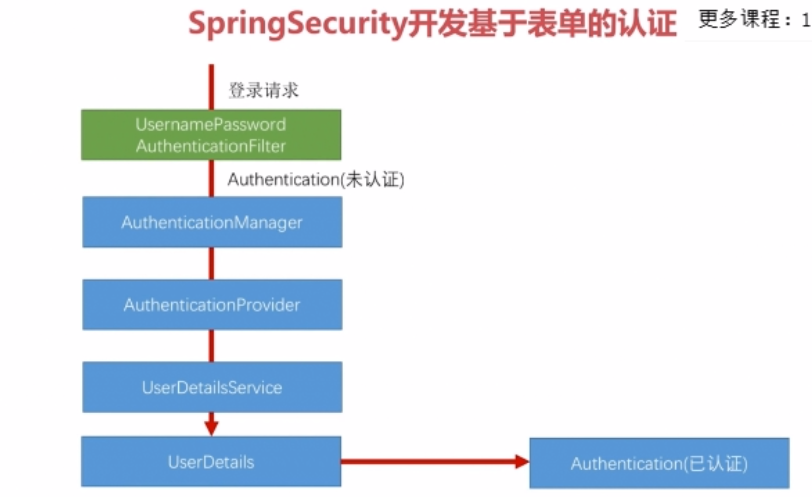spring security 学习二
doc:https://docs.spring.io/spring-security/site/docs/
基于表单的认证(个性化认证流程):
一、自定义登录页面
1、在securityConfigy配置类中的config方法中添加调用链方法
@Override protected void configure(HttpSecurity http) throws Exception { http.formLogin()//指定是表单登录 .loginPage("/cus_login.html")//登录页面 .and() .authorizeRequests()//授权 .anyRequest()//任何请求 .authenticated();//都需要身份认证 }
2、同时在resources/resources下创建一个html文件

<!DOCTYPE html>
<html lang="en">
<head>
<meta charset="UTF-8">
<title>Title</title>
</head>
<body>
自定义登录页面
</body>
</html>
/3、配置好之后,启动项目,访问localhost:9999/h api
浏览器后报错:,重定向到登录页面次数太多
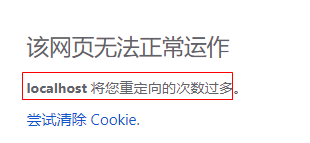
4、为什么出现这种情况:
因为在securityconfigy配置类中指定了一个loginPage,但是在方法链中,有表明:任何请求都需要认证
.anyRequest()//任何请求 .authenticated();//都需要身份认证
处理:在anyRequest方法前和authorizeRequests方法后添加antMatchers匹配规则,指定登录页面允许访问
.authorizeRequests()//授权 .antMatchers("/cus_login.html").permitAll()
配置完成后再次访问localhost:9999/h :,即可跳转至自定义的登录页面

5、完善登录页面
//在usernamePasswordAuthenticationFilter中处理的action为/login,请求方式是post
public UsernamePasswordAuthenticationFilter() { super(new AntPathRequestMatcher("/login", "POST")); }
<!DOCTYPE html> <html lang="en"> <head> <meta charset="UTF-8"> <title>Title</title> </head> <body> 自定义登录页面 <form action="/authentication/form" method="POST"> <table> <tr> <td>用户名:</td> <td><input type="text" name="username"></td> </tr> <tr> <td>密码:</td> <td><input type="text" name="password"></td> </tr> <tr> <td> <button type="submit">登录</button> </td> </tr> </table> </form> </body> </html>
因为在登录页面中设定的action为“/authentication/form”,所以在securityConfig配置类的方法链中添加loginProcessingUrl方法
@Override
protected void configure(HttpSecurity http) throws Exception {
http.formLogin()//指定是表单登录
.loginPage("/cus_login.html")//登录页面
.loginProcessingUrl("/authentication/form")
.and()
.authorizeRequests()//授权
.antMatchers("/cus_login.html").permitAll()
.anyRequest()//任何请求
.authenticated();//都需要身份认证
}
重启项目:访问localhost:9999/h
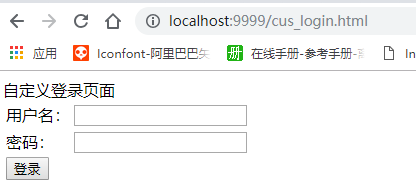
显示为自定义的页面。
csrf().disable();//跨站防护不适用

6、将loginPage(/cus_login.html) html页面改为一个controller代码
①新建一个controller
@RestController public class LoginSecurityController { @RequestMapping("/authentication/require") public String requireAuthentication(HttpServletRequest request, HttpServletResponse response) { return null; } }
②修改securityconfig配置类中的config中的方法调用链中的loginPage
@Override protected void configure(HttpSecurity http) throws Exception { http.formLogin()//指定是表单登录 .loginPage("/authentication/require")//登录页面 .loginProcessingUrl("/authentication/form") .and() .authorizeRequests()//授权 .antMatchers("/authentication/require").permitAll() .anyRequest()//任何请求 .authenticated()//都需要身份认证 .and() .csrf().disable();//跨站防护不适用 }
二、自定义登录成功的处理
实现AuthenticationSucessHandler接口,一下实现方式是:继承SaveRequestAwareAuthenticationSuccessHandler类(这样的话是可以根据请求方式的类型,来返回不同个数的数据,json或者默认)
package com.nxz.security.handler; import com.fasterxml.jackson.databind.ObjectMapper; import com.nxz.security.core.properties.LoginType; import com.nxz.security.core.properties.SecurityProperties; import lombok.extern.slf4j.Slf4j; import org.springframework.beans.factory.annotation.Autowired; import org.springframework.security.core.Authentication; import org.springframework.security.web.authentication.SavedRequestAwareAuthenticationSuccessHandler; import org.springframework.stereotype.Component; import javax.servlet.ServletException; import javax.servlet.http.HttpServletRequest; import javax.servlet.http.HttpServletResponse; import java.io.IOException; @Component("custAuthenticationSuccessHandler") @Slf4j public class CustAuthenticationSuccessHandler extends SavedRequestAwareAuthenticationSuccessHandler { @Autowired//springmvc自动注册的一个mapper类 private ObjectMapper objectMapper; @Autowired private SecurityProperties securityProperties; @Override public void onAuthenticationSuccess(HttpServletRequest httpServletRequest, HttpServletResponse httpServletResponse, Authentication authentication) throws IOException, ServletException { log.info("登录成功"); if (LoginType.JSON.equals(securityProperties.getBrowser().getLoginType())) { httpServletResponse.setContentType("application/json;UTF-8"); httpServletResponse.getWriter().write(objectMapper.writeValueAsString(authentication)); } else { super.onAuthenticationSuccess(httpServletRequest, httpServletResponse, authentication); } } }
@Autowired private AuthenticationSuccessHandler custAuthenticationSuccessHandler; http.formLogin() .loginPage("/authentication/require").loginProcessingUrl("/authentication/form") .successHandler(custAuthenticationSuccessHandler) .failureHandler(custAuthenticationFailerHandler) .and() .authorizeRequests() .antMatchers("/authentication/require",loginPage,"/code/image").permitAll() .anyRequest() .authenticated();
三、自定义登录失败的处理
实现AuthenticationFailureHandler接口,继承SimpleUrlAuthenticationFailureHandler,根据请求方式返回不同的类型
package com.nxz.security.handler; import com.alibaba.fastjson.JSON; import com.fasterxml.jackson.databind.ObjectMapper; import com.nxz.security.core.properties.LoginType; import com.nxz.security.core.properties.SecurityProperties; import lombok.extern.slf4j.Slf4j; import org.springframework.beans.factory.annotation.Autowired; import org.springframework.http.HttpStatus; import org.springframework.security.core.AuthenticationException; import org.springframework.security.web.authentication.SimpleUrlAuthenticationFailureHandler; import org.springframework.stereotype.Component; import javax.servlet.ServletException; import javax.servlet.http.HttpServletRequest; import javax.servlet.http.HttpServletResponse; import java.io.IOException; @Slf4j @Component("custAuthenticationFailerHandler") public class CustAuthenticationFailerHandler extends SimpleUrlAuthenticationFailureHandler { @Autowired private ObjectMapper objectMapper; @Autowired private SecurityProperties securityProperties; @Override public void onAuthenticationFailure(HttpServletRequest request, HttpServletResponse response, AuthenticationException exception) throws IOException, ServletException { log.info("登录失败!"); if (LoginType.JSON.equals(securityProperties.getBrowser().getLoginType())) { response.setStatus(HttpStatus.INTERNAL_SERVER_ERROR.value()); response.setContentType("application/json;charset=UTF-8"); response.getWriter().write(JSON.toJSONString(objectMapper.writeValueAsString(exception))); } else { super.onAuthenticationFailure(request, response, exception); } } }
@Autowired private AuthenticationFailureHandler custAuthenticationFailerHandler;
四、源码学习
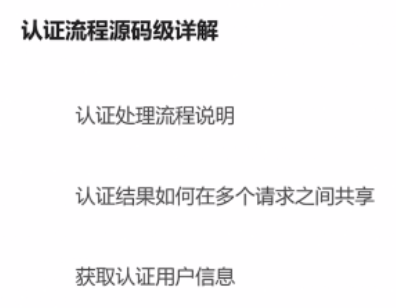
1、认证流程说明
登录请求进来是,会先到UsernamePasswordAuthentication类的,其实最先走的是它的父类AbstractAuthenticationProcessingFilter.java,在父类中会走attemptAuthentication方法,父类没有实现,因此会走子类的方法,当认证成功后,会走到最后successFulAuthentication方法
public void doFilter(ServletRequest req, ServletResponse res, FilterChain chain) throws IOException, ServletException { 。。。。
。。。。 Authentication authResult; try { authResult = attemptAuthentication(request, response); if (authResult == null) { // return immediately as subclass has indicated that it hasn't completed // authentication return; } sessionStrategy.onAuthentication(authResult, request, response); } 。。。。 。。。。 // Authentication success if (continueChainBeforeSuccessfulAuthentication) { chain.doFilter(request, response); } successfulAuthentication(request, response, chain, authResult); }
attemptAuthentication方法(子类usernamepasswordAuthenticationFilter.java)
public Authentication attemptAuthentication(HttpServletRequest request, HttpServletResponse response) throws AuthenticationException { if (postOnly && !request.getMethod().equals("POST")) { throw new AuthenticationServiceException( "Authentication method not supported: " + request.getMethod()); } String username = obtainUsername(request); String password = obtainPassword(request); 。。。。
。。。。
username = username.trim(); //这个UsernamepasswordAuthenticationToken其实就是封装了username 和password信息 UsernamePasswordAuthenticationToken authRequest = new UsernamePasswordAuthenticationToken( username, password); // 这个setDetails会把请求的一些信息设置到authRequest对象中 setDetails(request, authRequest); return this.getAuthenticationManager().authenticate(authRequest); }
上边那个this.getAuthenticationManager() 会获取一个authenticationManager类
作用:收集相关的provider,当请求到的时候,循环判断是否支持当前的provider类型
public interface AuthenticationManager {
//authenticate认证方法,交给实现类实现 Authentication authenticate(Authentication var1) throws AuthenticationException; }
他的实现类(用的就是ProviderManger类),不同的provider支持的Authentication是不同的
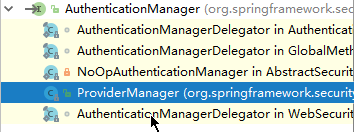
例如:UsernamePasswordAuthenticationToken类型的Authentication时,provider就是DaoAuthenticationProvider,
public Authentication authenticate(Authentication authentication) throws AuthenticationException { Class<? extends Authentication> toTest = authentication.getClass(); AuthenticationException lastException = null; AuthenticationException parentException = null; Authentication result = null; Authentication parentResult = null; boolean debug = logger.isDebugEnabled(); Iterator var8 = this.getProviders().iterator(); while(var8.hasNext()) { AuthenticationProvider provider = (AuthenticationProvider)var8.next(); if (provider.supports(toTest)) { if (debug) { logger.debug("Authentication attempt using " + provider.getClass().getName()); } try { result = provider.authenticate(authentication); if (result != null) { this.copyDetails(authentication, result); break; } } catch (AccountStatusException var13) { this.prepareException(var13, authentication); throw var13; } catch (InternalAuthenticationServiceException var14) { this.prepareException(var14, authentication); throw var14; } catch (AuthenticationException var15) { lastException = var15; } } } 。。。。。 }
上边那个标红的provider.authenticate方法会走到DaoAuthenticationProvider对象的父类对象的authticate方法,
public Authentication authenticate(Authentication authentication) throws AuthenticationException { Assert.isInstanceOf(UsernamePasswordAuthenticationToken.class, authentication, () -> { return this.messages.getMessage("AbstractUserDetailsAuthenticationProvider.onlySupports", "Only UsernamePasswordAuthenticationToken is supported"); }); String username = authentication.getPrincipal() == null ? "NONE_PROVIDED" : authentication.getName(); boolean cacheWasUsed = true; UserDetails user = this.userCache.getUserFromCache(username); if (user == null) { cacheWasUsed = false; try {
//这块会进入子类DaoAuthenticationPrivoder user = this.retrieveUser(username, (UsernamePasswordAuthenticationToken)authentication); } catch (UsernameNotFoundException var6) { this.logger.debug("User '" + username + "' not found"); if (this.hideUserNotFoundExceptions) { throw new BadCredentialsException(this.messages.getMessage("AbstractUserDetailsAuthenticationProvider.badCredentials", "Bad credentials")); } throw var6; } Assert.notNull(user, "retrieveUser returned null - a violation of the interface contract"); } try {
//校验是否锁定。。(userdetails里边的几个返回值) this.preAuthenticationChecks.check(user);
//校验密码是否匹配 this.additionalAuthenticationChecks(user, (UsernamePasswordAuthenticationToken)authentication); } catch (AuthenticationException var7) { if (!cacheWasUsed) { throw var7; } cacheWasUsed = false; user = this.retrieveUser(username, (UsernamePasswordAuthenticationToken)authentication)
this.preAuthenticationChecks.check(user); this.additionalAuthenticationChecks(user, (UsernamePasswordAuthenticationToken)authentication); } //后置查询 this.postAuthenticationChecks.check(user); if (!cacheWasUsed) { this.userCache.putUserInCache(user); } Object principalToReturn = user; if (this.forcePrincipalAsString) { principalToReturn = user.getUsername(); } return this.createSuccessAuthentication(principalToReturn, authentication, user); }
子类DapAuthenticationPrivoder类的
protected final UserDetails retrieveUser(String username, UsernamePasswordAuthenticationToken authentication) throws AuthenticationException { this.prepareTimingAttackProtection(); try {
//这一块就是调用自定义得人UserDetailsService类 UserDetails loadedUser = this.getUserDetailsService().loadUserByUsername(username); if (loadedUser == null) { throw new InternalAuthenticationServiceException("UserDetailsService returned null, which is an interface contract violation"); } else { return loadedUser; } } catch (UsernameNotFoundException var4) { this.mitigateAgainstTimingAttack(authentication); throw var4; } catch (InternalAuthenticationServiceException var5) { throw var5; } catch (Exception var6) { throw new InternalAuthenticationServiceException(var6.getMessage(), var6); } }
进入自定义的CusUserDetailsService
public class MyUserDetailsService implements UserDetailsService { @Override public UserDetails loadUserByUsername(String s) throws UsernameNotFoundException { //根据username查找用户信息,在这,先手动写一个user信息 log.info("查找用户信息{}", s); BCryptPasswordEncoder encoder = new BCryptPasswordEncoder(); String password = encoder.encode("password"); //user前两个参数是进行认证的,第三个参数是当前用户所拥有的权限,security回根据授权代码进行验证 return new User(s, password, true, true, true, true, AuthorityUtils.commaSeparatedStringToAuthorityList("admin")); // AuthorityUtils.commaSeparatedStringToAuthorityList 这个方法是将一个字符一“,” 分割开 } }


